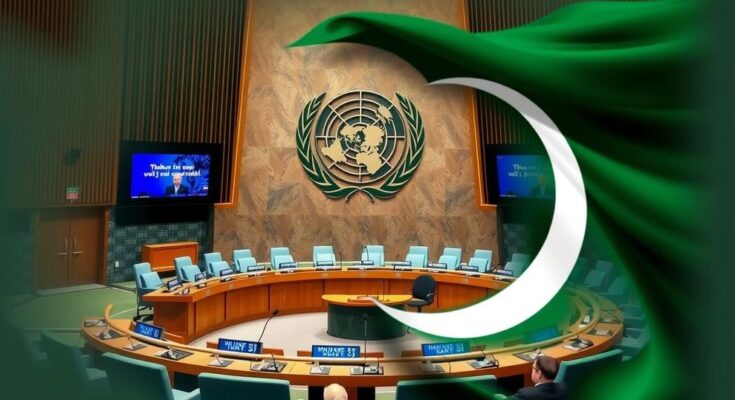Pakistan has resumed its role as a non-permanent member of the UNSC for the eighth time, marking the start of its two-year term following the installation of its national flag at a ceremonial event. The country replaces Japan in one of the Asia-Pacific seats and will preside over the council in July 2025, aiming to influence discussions on key global challenges and advocate for oppressed populations.
The flag of Pakistan was ceremoniously installed in front of the United Nations Security Council (UNSC) chamber as Pakistan commenced its eighth term as a non-permanent member for the term 2025-26. This important event highlights Pakistan’s renewed commitment to participate actively in global discussions on issues of significant international concern. Pakistan has replaced Japan to fill one of the Asia-Pacific seats allocated for non-permanent membership, which will allow the country to play a vital role in ongoing global dialogues for the next two years.
During this period, Pakistan is set to preside over the UNSC in July, offering a unique opportunity to influence the council’s agenda and promote constructive dialogue among member states. As part of the joining ceremony, the flags of five new non-permanent members—including Denmark, Greece, Panama, and Somalia—were also installed, replacing the outgoing members Japan, Ecuador, Malta, Mozambique, and Switzerland.
Pakistan’s Alternate Permanent Representative, Ambassador Asim Iftikhar Ahmad, underscored the importance of this term by affirming Pakistan’s commitment to the principles outlined in the UN Charter, particularly in maintaining international peace and developing cooperative relationships among nations. Recognizing the challenges faced by many nations, he emphasized Pakistan’s role as a voice for those enduring foreign occupation and suffering from oppression. The newly elected member will also gain a position on the Islamic State (ISIS) and Al Qaeda Sanctions Committee, underscoring Pakistan’s engagement in critical counter-terrorism discussions on a global platform.
Ambassador Ahmad articulated the necessity for multilateral cooperation, stating, “We need to earnestly address the root causes of long-outstanding and new conflicts, prioritise dialogue and diplomacy, and support confidence building at regional and global levels.” He remarked that working collaboratively with other members to pursue fair and peaceful solutions would be essential during Pakistan’s tenure. The ongoing efforts emphasize upholding the UN Charter and the effective implementation of the Security Council’s decisions as paramount to ensuring a more stable and secure world.
The United Nations Security Council (UNSC) plays a crucial role in maintaining international peace and security, comprising 15 members, including five permanent members with veto power and ten non-permanent members elected for two-year terms. Pakistan has previously served on the UNSC multiple times between 1948 and 2014, engaging in high-stakes negotiations and decisions concerning global security. The installation of the Pakistani flag and the commencement of its term as a non-permanent member is pivotal for its diplomatic and strategic engagement with other nations, particularly in the dynamic geopolitical landscape of the Asia-Pacific region.
In conclusion, Pakistan’s installation at the UNSC symbolizes its commitment to international diplomacy and security. As a newly elected non-permanent member, Pakistan seeks to voice the concerns of oppressed peoples while advocating for sustained dialogue and collaboration to address global challenges. The next two years present both opportunities and responsibilities for Pakistan to lead discussions on pressing international issues and to enhance cooperation among its member states.
Original Source: www.dawn.com




